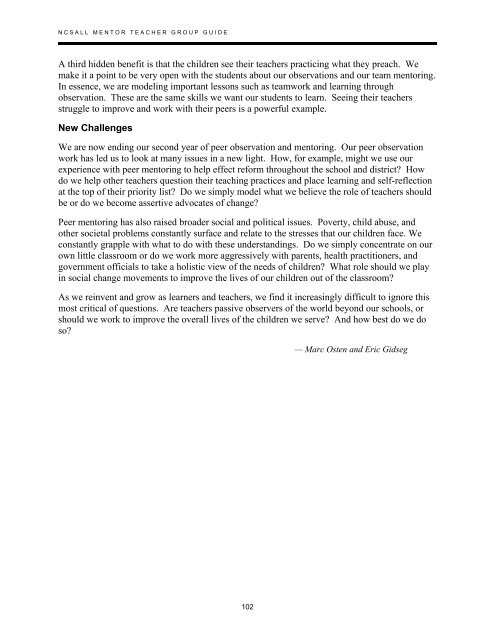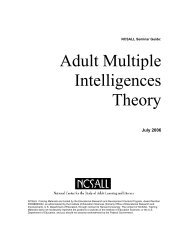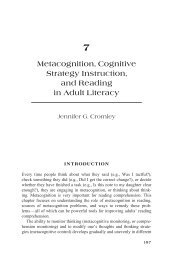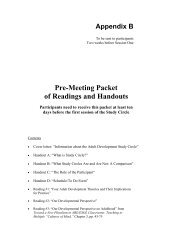Handouts and Articles on Classroom Observation, Peer Coaching ...
Handouts and Articles on Classroom Observation, Peer Coaching ...
Handouts and Articles on Classroom Observation, Peer Coaching ...
Create successful ePaper yourself
Turn your PDF publications into a flip-book with our unique Google optimized e-Paper software.
N C S A L L M E N T O R T E A C H E R G R O U P G U I D EA third hidden benefit is that the children see their teachers practicing what they preach. Wemake it a point to be very open with the students about our observati<strong>on</strong>s <str<strong>on</strong>g>and</str<strong>on</strong>g> our team mentoring.In essence, we are modeling important less<strong>on</strong>s such as teamwork <str<strong>on</strong>g>and</str<strong>on</strong>g> learning throughobservati<strong>on</strong>. These are the same skills we want our students to learn. Seeing their teachersstruggle to improve <str<strong>on</strong>g>and</str<strong>on</strong>g> work with their peers is a powerful example.New ChallengesWe are now ending our sec<strong>on</strong>d year of peer observati<strong>on</strong> <str<strong>on</strong>g>and</str<strong>on</strong>g> mentoring. Our peer observati<strong>on</strong>work has led us to look at many issues in a new light. How, for example, might we use ourexperience with peer mentoring to help effect reform throughout the school <str<strong>on</strong>g>and</str<strong>on</strong>g> district? Howdo we help other teachers questi<strong>on</strong> their teaching practices <str<strong>on</strong>g>and</str<strong>on</strong>g> place learning <str<strong>on</strong>g>and</str<strong>on</strong>g> self-reflecti<strong>on</strong>at the top of their priority list? Do we simply model what we believe the role of teachers shouldbe or do we become assertive advocates of change?<strong>Peer</strong> mentoring has also raised broader social <str<strong>on</strong>g>and</str<strong>on</strong>g> political issues. Poverty, child abuse, <str<strong>on</strong>g>and</str<strong>on</strong>g>other societal problems c<strong>on</strong>stantly surface <str<strong>on</strong>g>and</str<strong>on</strong>g> relate to the stresses that our children face. Wec<strong>on</strong>stantly grapple with what to do with these underst<str<strong>on</strong>g>and</str<strong>on</strong>g>ings. Do we simply c<strong>on</strong>centrate <strong>on</strong> ourown little classroom or do we work more aggressively with parents, health practiti<strong>on</strong>ers, <str<strong>on</strong>g>and</str<strong>on</strong>g>government officials to take a holistic view of the needs of children? What role should we playin social change movements to improve the lives of our children out of the classroom?As we reinvent <str<strong>on</strong>g>and</str<strong>on</strong>g> grow as learners <str<strong>on</strong>g>and</str<strong>on</strong>g> teachers, we find it increasingly difficult to ignore thismost critical of questi<strong>on</strong>s. Are teachers passive observers of the world bey<strong>on</strong>d our schools, orshould we work to improve the overall lives of the children we serve? And how best do we doso?— Marc Osten <str<strong>on</strong>g>and</str<strong>on</strong>g> Eric Gidseg102





